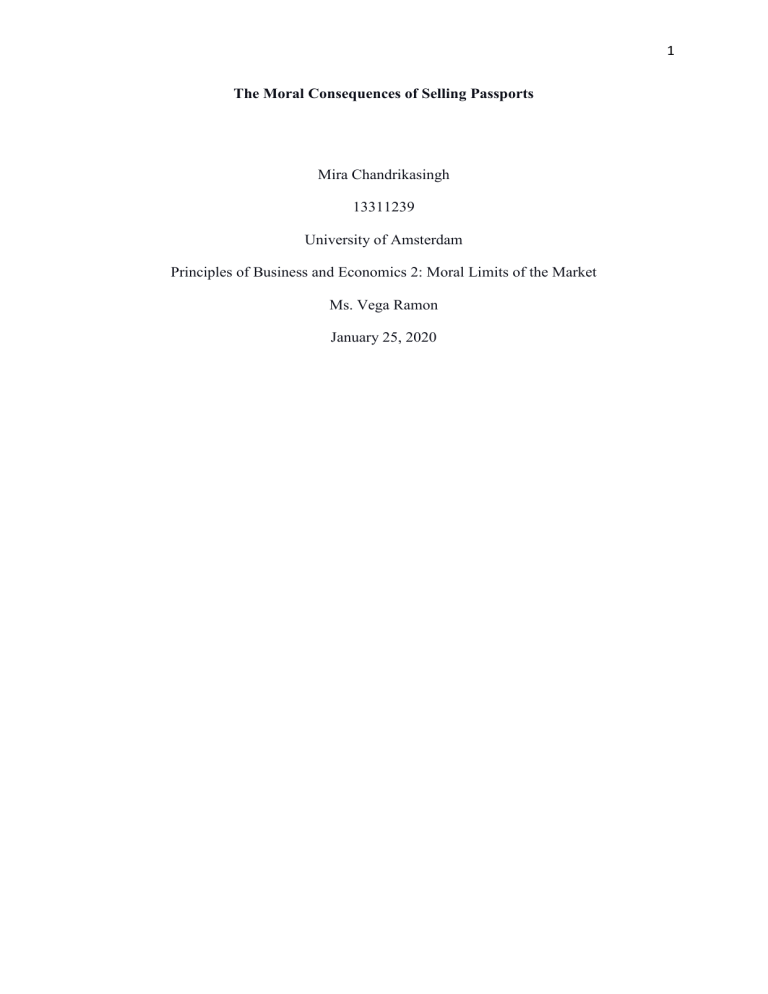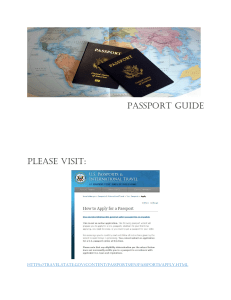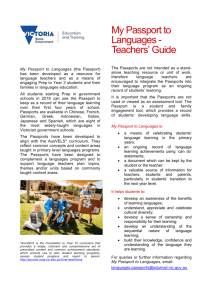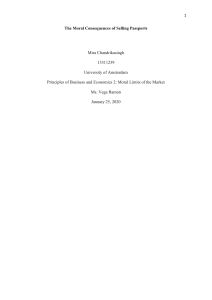
1 The Moral Consequences of Selling Passports Mira Chandrikasingh 13311239 University of Amsterdam Principles of Business and Economics 2: Moral Limits of the Market Ms. Vega Ramon January 25, 2020 2 Introduction (I) Cyprus has recently suspended their grand golden passport scheme due to potentially having assisted in aiding a fictitious Chinese businessman with a criminal record (BBC, 2020). This is the consequence of the long-standing debate on whether passports should be for sale in the first place. Cyprus and Malta are the only countries that have this option available (most other EU countries require DNA heritage or a minimum living time before they can apply for citizenship) (The Economist, 2020). This policy affects the native EU citizens, governments, wealthy foreigners outside of the EU, and asylum seekers. The desire for citizenship also however concerns asylum seekers, a group of people who are not considered in the policy. This essay will look at having EU passports as a commodity and evaluating its moral legitimacy therefore the research question is “to what extent is having EU passports as a commodity morally legitimate?” The way in which the RQ will be addressed and answered will be through setting moral criteria and assessing the arguments against them to evaluate whether having the EU passport as a purchasable commodity is morally legitimate or not. One could suggest that it is ethical for passports to be commodities if certain precautions are taken, this can include thorough background checks for wealthy foreigners or creating more opportunity for refugees. The academic sources that will be used will come from journals and papers derived from Google Scholar as well as material received from the course which includes the textbook ‘Modern Principles of Economics’ by Cowen and Tabarrok (Cowen & Tabarrok, 2010). As for non-academic sources, government websites will be used to provide statistics and official news articles will be used to confirm/validate present events regarding the topic. The structure of this paper goes as followed; Introduction (i), theoretical background (ii), analysis (iii), and conclusion (iv). This introduction establishes the issue at hand and the research method in how different perspectives get analyzed. The theoretical background will provide fixed definitions and criteria through the lens of the chosen framework for the analysis. Relevant theories that are will be explained. The analysis will take these criteria and provide arguments for and against the moral legitimacy of EU passports as a commodity. All arguments will be backed up by academic papers and other official sources. The conclusion will weigh all the arguments and a conclusion will be drawn based on the strongest claims. It will also include limitations of this paper and its arguments as well as further questions that could be posed in the future. This paper is relevant because it is about a current world issue that needs attention. The refugee crisis and European migration crisis are ongoing problems and is affecting millions of people, not only the refugees but also EU citizens. This paper will look at this issue through a particular vertical framework. 3 Theoretical Framework (II) Defining the key terms is crucial as this is a subjective essay. As previously unpacked, the main topic is the EU passport. A passport is a government official document that establishes one's identity and citizenship. The EU passport in particular also beholds many benefits which include; traveling visa-free to 153 countries, free traveling and business expansion within the EU, subsidized education, healthcare benefits, and property ownership (European Union, 2020). There is also an ongoing refugee crisis which officially started on the 15th of April 2011, when the Syrian civil war broke out. A commodity is a good that can be bought or sold and interchanged with something of the same value (ie: money) (Chen, 2020). The final element of the RQ is “morally legitimate” This will refer to what is ethically correct, in this essay in the view of utilitarianism. The vertical framework this essay will focus on will be utilitarianism. It was established as a school of thought by Jeremy Bentham in the mid 18th century. Before that, however, it was recognized from Epicureanism by the Greek philosopher Epicurus (Scarre, 1996). Utilitarianism argues that moral actions should be measured solely by their outcome, there must be more pleasure than pain out of the action for it to be ethical. Utilitarianism is derived from consequentialism which is a moral theory that does not specify the desired outcome whereas utilitarianism specifies its preferences. It is focused on hedonism which only looks at pleasure over pain however pluralism can be found within the field of thought, instead of only considering pain and pleasure, there are more factors involved such as truth, beauty, freedom, and identity (Bailey & Mill, 2016). Hedonism concerns itself with pleasure and self-indulgence and is the highest good (Veenhoven, 2003). Utilitarians decide which actions are the best moral decision by following a cost-benefit calculus. This entails considering what the options are, recognizing the amount of wellbeing it is going to produce, and then choosing the action with the highest level of wellbeing for the greatest number of individuals (Hart, 2021). Theories that will be explored in answering this question are the following; The concept of the free market is an economic system where the price is determined by the forces of demand and supply. There is no government intervention and price is left in the hands of the buyers and sellers. Resource allocation is considered to be at maximum efficiency using this system (Cowen & Tabarrok, 2010). Efficiency is officially defined as “(of a system or machine) achieving maximum productivity with minimum wasted effort or expense” (Lexico, n.d.) This system also creates and encourages incentives, which is something that motivates and encourages people in the workforce to perform better, often through a reward system (Milne, 2007). A key definition that is crucial to understand the 4 RQ is defining what utility maximization means. The utility is used in economics to model the worth or value of something. Thus, utility maximization is when individuals and firms aim to get the highest satisfaction and value from their economic decision (Wight, 2014). Rawls’ maximin principle is an ethical theory that combats inequality. It aims to maximize the welfare of those who are at the bottom of society, financially and equality will be achieved when the subjects adhere to the assumption that it is “rational and prudent to prepare for the worst” (Rawls, 1958). Stakeholders that are involved are the following; sellers, buyers, EU citizens, and asylum seekers. Firstly, the seller is the EU which was earlier defined, but this will also represent governments within the EU. It will be used as a placeholder to express a group of people that decide things for a country. The buyer in this exchange is the wealthy foreigners that have no access to EU passports through DNA or living experience. The wealthy may want to purchase a passport for work, safety, travel/leisurely purposes or as a backup plan (Springer, 2020). Thirdly, the asylum seekers play an indirect role. An asylum seeker is a person who has fled from their home country as a political refugee and is seeking asylum somewhere else. These are common people with few resources and low financial stability (Myerson, 1981). They are in most need of a passport yet do not have the financial means to do so. Assuming that there is a capacity to total EU citizens, should a passport be commoditized for those who can afford it or should it be offered to those who need it? Finally, the last stakeholder are the native EU citizens who want to protect the value of their identity, tradition, and values. To tie the stakeholders to the ethical framework, comparisons between individual pleasure or pain and societal pleasure or pain should be made. On an individual level pleasure is preferred over pain, however, once society’s utility is in consideration, maximizing utility leads to preferring societal pleasure over individual pleasure and the opposite goes for pain and suffering (Wight, 2014). The criteria that will be used to evaluate the moral legitimacy of having EU passports as a commodity. It will be split between the hedonistic approach and the pluralist approach. Firstly, maximizing utility must be considered. In simple form, who gains pleasure, who suffers, and which outweighs the other. In this discussion, the parties involved are wealthy foreigners, asylum seekers, the EU government, the Cyprus government, the Cyprus citizens, and EU citizens. Utility maximization is about seeking the highest satisfaction from an economic decision. Secondly, the pluralist approach will consider freedom as a factor alongside pain and pleasure which involves the financial position of the different buyers and selectively choosing who the passports will be sold to. 5 Analysis (III) As previously mentioned, utility maximization is a key component of the utilitarian framework. In the case that passports are considered a commodity, it can be considered morally legitimate through the utilitarian lens for the following reasons. Cyprus’ revenue from selling golden passports made up of 7.5% of its annual GDP, which was about 1.45 billion euros (Pavolvska, 2020). This has many positive implications, as the official European Union website states “EU economic policy focuses on creating jobs and boosting growth by making smarter use of financial resources, removing obstacles to investment, and providing visibility and technical assistance to investment projects.” (European Union, n.d.). Not only does the EU benefit, the buyer of the passport now has access to all the benefits that the EU provides which include the ability to expand thy business, subsidies, property ownership, and the ability to travel freely within the EU. If for example, a wealthy businessman purchases a passport he will be able to expand his business throughout all of Europe with low(er) costs (Polaron, n.d.). By being able to expand in this way, this may lead to economies of scale which leads to higher rates of efficiency and thus utility maximization (Smith, 1776). For the buyer, it is more like an investment since this purchase will open the door to many other opportunities that allow them to earn it back and create profit. Another way in which the EU could maximize pleasure is by using this extra generated money, through both purchase and profits) is to aid asylum seekers and improve the country. This could be through improving infrastructure or renovating public services (Wallace, Pollack, & Young, 2015). When EU passports are considered a commodity, through utility maximization, it can be considered morally legitimate. Despite there being clear evidence that there is more pleasure than pain when EU passports are considered a commodity, there are many ways in which this could be seen as a disadvantage. For instance, asymmetric information can lead to more pain than pleasure in the long run. Through moral hazard, wealthy foreign criminals will be able to purchase an EU passport, gain all its benefits and commit crimes within the EU (Peel, 2020). This is closely related to the recent event in Cyprus. A fictitious businessman “purchased” a passport, however, the Cyprian government failed to see that he had a (fake) criminal record, which led to an investigation and the temporary halting of selling passports (BBC, 2020). The utility is no longer maximized for both parties when there is malintent from either side. Another instance where utility is no longer maximized when EU passports are a commodity is when criminals may feel that their actions are justified because they are paying such a hefty price. In the short-run the EU benefits as they receive a large payment, however in the long term this may backfire since crime brought to the EU may cost them that price if not more. A clear example of this is portrayed in the daycare experiment conducted in Israel (Bowles, 2008). After applying a fee to late parents, the parents felt less guilty towards arriving late as they had already contributed which justified their lateness. A similar line of thinking can be applied to wealthy foreigners with a criminal record, since they are already paying a large fee, the potential crimes they bring to Europe have already been accounted for. 6 Pluralism can be found in many schools of thought within the field of ethics, this includes Utilitarianism. As with Hedonism many faults and loopholes can be found, such as drug addiction. Drugs may give one more pleasure as an outcome however that does not necessarily make it ethical. Thus the introduction of pluralism, where more factors are included when determining the success of an outcome. Instead of only pleasure and pain, truth, beauty, and freedom can also be considered. This argument will largely focus on the aspect of freedom. Freedom is now a factor that must be considered deciding if the action is moral. Considering refugees, it would be morally legitimate for passports to be a commodity as it grants them access to a high level of freedom. This could present itself in the form of freedom of speech, freedom to exist and live, things that they aren’t able to do in their home country. To incorporate Rawls’ maximin theory (Crocker, 1977); he approves of inequalities if the outcome benefits those worst off. Thus, passports should be a commodity, however only available for refugees since they are able to better their lives and benefit from the purchase. Wealthy foreigners on the other hand will not be able to purchase this because they are not worst off and will not benefit as much compared to the refugees. Therefore, having passports as a commodity is moral as long as it will be available and sold to asylum seekers who need it to live rather than wealthy foreigners who aren’t in need of it. The counter-argument to incorporating freedom into the desired outcome is the consequences of the free market. Given the refugee crisis, lots of people are now in need of passports and citizenship to EU countries. This will create a high demand for passports, and this will drive the price upwards. This contradicts what was previously said because not only will it not be affordable for all, but the richest of the poorest will have access to it. By creating a market for passports, those who need it the most and are least able to access it will be left out which is why passports should not be a commodity. When evaluating these arguments, the difference between hedonism and pluralism is quite stark however both can justify having passports as a commodity morally legitimate. When aiming to achieve utility maximization, all stakeholders directly involved benefit (greatly) however what is overlooked are those who are indirectly negatively affected. In this case, the wealthy foreigners and the EU benefit economically speaking, however, a more pressing and urgent stakeholder suffers. Another risk is the long-term “pain” which could be achieved through asymmetric information. This very consequence played out in the recent event in Cyprus. When aiming for freedom in the outcome, it is also morally legitimate to have passports as a commodity, especially with Rawls’ maximin principle, however the risk of excess demand may cause issues with the pricing of the passport. Eventually both criteria have been met, but not to its fullest extent. With the hedonist approach, background checks would be essential in order to avoid the risk of fraud, and the benefits of selling passports at a high price must be acknowledged. Whereas with the pluralist perspective 7 Conclusion (IV) Initially, Cyprus halted its market for their passport due to aiding a fictitious businessman with a criminal record. This led to the discussion and evaluation of whether having EU passports as a commodity is morally legitimate. The initial research question was ‘To what extent is having an EU passport as a commodity morally legitimate?’ Through using the utilitarian ethical framework, and the two criteria; utility maximization and the pluralist value of freedom. The two claims in favor argue that the wealthy foreigners and EU will greatly benefit financially as well as giving asylum seekers an opportunity to better their lives. However, there are dangers which include the potential risk and longterm damage to the EU through moral hazard and destabilizing the price of the passport due to excess demand. Utilitarian ethics is only concerned with the outcome and is measured in happiness and pleasure. In contrast to other normative vertical frameworks, this doesn't concern itself with the morals of the act or the morals of the character performing the act. In the perspective of utilitarianism, it is morally legitimate to have EU passports as a commodity to the extent that long term risks have been minimized through thorough background checks and making sure that refugees who are much less financially stable have the ability and opportunity at purchasing a passport. To conclude, the EU would have to create two different markets for the different buyers and the main difference being the price of the golden passport. By controlling the price, they can charge more for those who are willing and able to buy it as well as make it available for people suffering through a current world crisis. Limitations to this research and analysis include the lack of studies and experiments conducted regarding this concept of making passports buyable commodities. Since the ability to purchase passports has only recently begun, there is more discussion than evidence which may affect the claims made within this essay. Due to there being a lack of research and experimentation in this field regarding this topic, the claims are primarily based on hypothetical conclusions. The field of legal implications have not been addressed, however are of importance as well. This essay also only includes the utilitarian perspective, this does not equate to a complete conclusion on the moral legitimacy of making passports a purchasable good. Further research on this subject could be conducted when exploring the different implications for the different stakeholders involved, especially when it comes to utility maximization. The pleasure and pain could be compared on an individual and societal level. Research could also be done about how the consequences for asylum seekers could change if the price of the passport were to go up or down. Word Count: 2987 8 Reference List Bailey, J., & Mill, J. S. (2016). Utilitarianism. Ontario: Broadview Press. BBC. (2020, October 13). Cyprus to suspend 'EU golden passports' scheme. Retrieved from BBC News: https://www.bbc.com/news/world-europe-54522299 Bowles, S. (2008). Policies Designed for Self-Interested Citizens May Undermine "The Moral Sentiments": Evidence from Economic Experiments . Science, 1605-1609. Chen, J. (2020, February 14). Commodity. Retrieved from Investopedia: https://www.investopedia.com/terms/c/commodity.asp Cowen, T., & Tabarrok, A. (2010). Modern Principles of Economics 4th Edition. New York : Worth Publishers. Crocker, L. (1977). Equality, Solidarity, and Rawls' Maximin. Philosophy & Public Affairs, 262266. The Economist. (2020). The right to sell passports; Charlemagne. The Economist, 52. Retrieved from The Economist. European Union. (2020, December 18). What the EU does for its citizens. Retrieved from European Union: https://europa.eu/european-union/about-eu/what-the-eu-doesfor-its-citizens_en European Union. (n.d.). The Economy. Retrieved from European Union: https://europa.eu/european-union/about-eu/figures/economy_en Hart, G. (2021). Applying Utilitarianism: Are Insider Trading and the Bailout of GM Ethical? Retrieved from Seven Pillars Institute for Finance and Ethics: https://sevenpillarsinstitute.org/ethics-101/applying-utilitarianism-are-insidertrading-and-the-bailout-of-gmethical/#:~:text=Utilitarianism%20is%20a%20consequentialist%20moral,the%20goo d%20of%20one's%20self.&text=One%20difference%2C%20however%2C%20is%2 Lexico. (n.d.). Efficient. Retrieved from Lexico: https://www.lexico.com/definition/efficient Milne, P. (2007). Motivation, incentives and organisational culture. Journal of Knowledge Management , 28-38. Myerson, R. B. (1981). Utilitarianism, Egalitarianism, and the Timing Effect in Social Choice Problems. Econometrica, 883-897. Peel, M. (2020, October 17). Cyprus scandal exposes EU ‘golden passport’ problem. Retrieved from Financial Times: https://www.ft.com/content/c834acfe-c053-4c8f81db-61c0cbe29e68 Polaron. (n.d.). 12 benefits of EU citizenship. Retrieved from Polaron: https://polaron.com.au/info/blog/12-benefits-of-eu-citizenship/ Pavolvska, E. (2020, October 16). Controversial golden passport system scrapped. Retrieved from New Europe: https://www.neweurope.eu/article/controversial-goldenpassport-system-scrapped/ Rawls, J. (1958). Justice as fairness. The Philosophical Review, 164-194. Scarre, G. (1996). Utilitarianism and Enlightenment. In G. Scarre, The problems of philosophy: Utilitarianism (pp. 48-72). London: Routledge. 9 Smith, A. (1776). An Inquiry Into the Nature and Causes of the Wealth of Nations . London: J. J. Tourneisen of Basle. Springer, K. (2020, August 7). Passports for purchase: How the elite get through a pandemic. Retrieved from CNN Travel: https://edition.cnn.com/travel/article/buying-multiplepassports-pandemic/index.html Veenhoven, R. (2003). Hedonism and Happiness. Journal of Happiness Studies, 437–457. Wight, J. B. (2014). Economics within a Pluralist Ethical Tradition. Review of Social Economy, 417-435. Wallace, H., Pollack, M. A., & Young, A. R. (2015). Policy-making in the European Union. Oxford: Oxford University Press.



